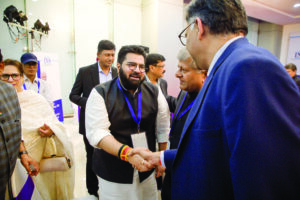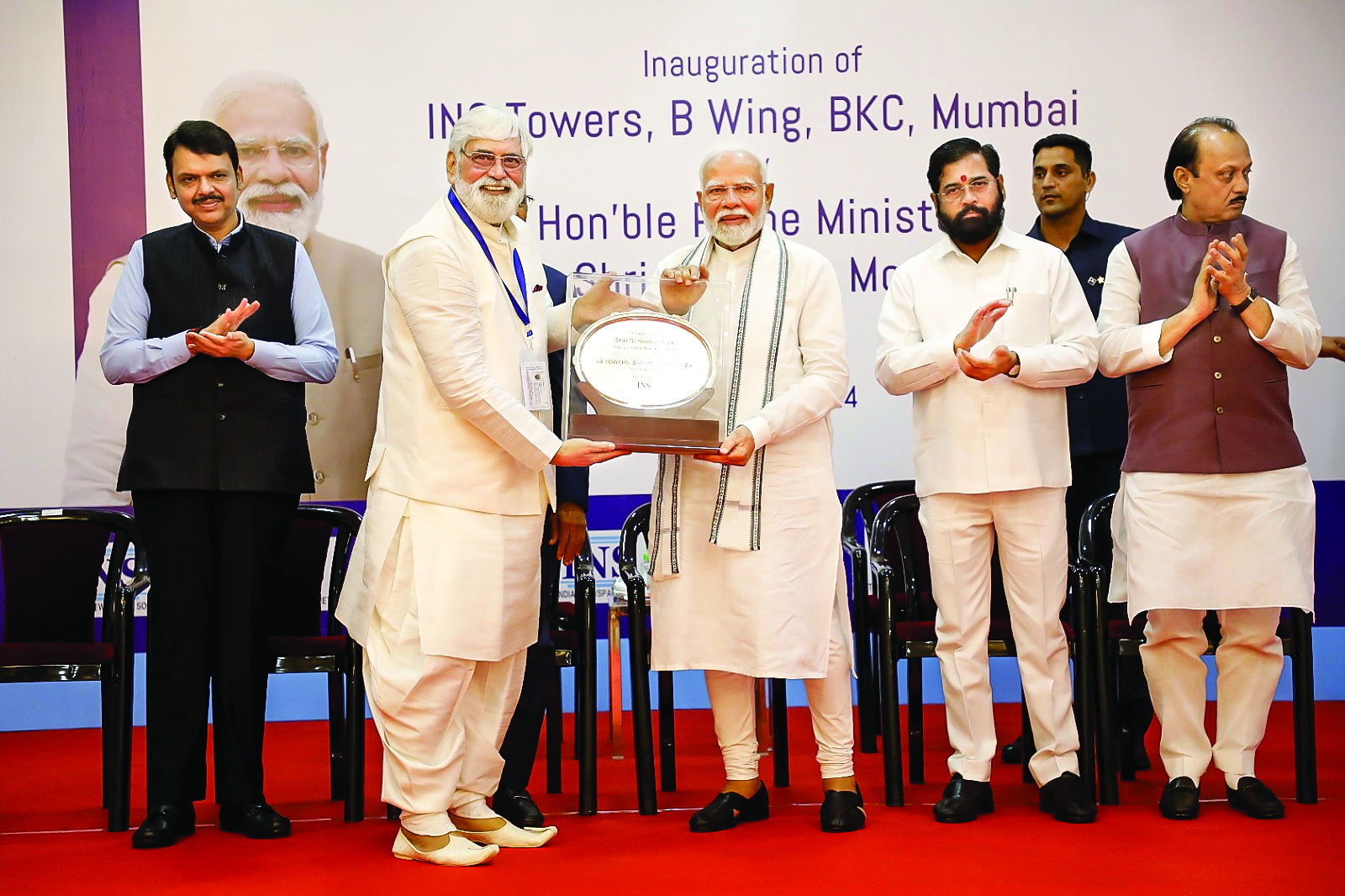MUMBAI: During his first visit to Mumbai after taking over as Prime Minister for the third time, PM Narendra Modi visited the Indian Newspaper Society (INS) Secretariat at G-Block, Bandra Kurla Complex, where he inaugurated the INS Towers, the new state-of-the-art building designed to meet the modern and efficient office space requirements of INS members in Mumbai. The INS Towers now serve as the central hub for the city’s newspaper industry, marking a significant milestone in enhancing infrastructure for media operations in Mumbai. PM Modi was in the city to launch projects worth Rs 29,000 crore.
The inauguration ceremony began with a ceremonial unveiling of the plaque followed by a very warm welcome of the Prime Minister by Rakesh Sharma, President of the Indian Newspaper Society, followed by an address by the Prime Minister.
Rakesh Sharma, who is also the publisher of The Sunday Guardian, welcomed spoke of the Prime Minister’s role in leading the nations of the world. “We all have seen the Prime Minister’s capability to provide leadership to the world at the G20 summit when they gave the slogan of ‘One Earth, One Family’,” he said.
NewsX Editor-in-Chief, Rishab Gulati welcomed the dignitaries present at the INS Secretariat. The dignitaries, apart from the Prime Minister included Governor of Maharashtra Ramesh Bais, Chief Minister of Maharashtra Eknath Shinde, and Deputy Chief Ministers Devendra Fadnavis and Ajit Pawar. Rajya Sabha MP Kartikeya Sharma was also present at the occasion.

Sharma at the event.
The Prime Minister began his speech by expressing that the media was not just a mirror of the country’s conditions; but also plays a crucial role in changing conditions and guiding the country. He emphasized that today, India is at a juncture where the next 25 years of its journey are very important. During these 25 years, it is equally crucial for newspapers and magazines to play their role in making India develop.
Prime Minister Modi highlighted that it is the media that makes the citizens of the country aware. It is the media that constantly reminds citizens of their rights. And it is the media that makes the people of the country realize their potential. It was noted that when citizens gain confidence in their capabilities, the country begins to achieve new heights of success. This is happening in India today.
MEDIA’S ROLE IN PROMOTING IDEAS
The PM also spoke about the Media’s role in how it can promote the idea of government and spoke of the time when the country celebrated the Amrit Mahotsav. In this context, he said, “Friends, if the government starts a program, it is not necessary that it is only a government program. If the government emphasizes an idea, it is not necessary that it is only the government’s idea. For instance, the country celebrated the Amrit Mahotsav, the country ran the Har Ghar Tiranga campaign. The government did start it, but the entire country adopted and promoted it.”
“Similarly, today the country is talking of the environment; it is a matter of humanity’s future beyond politics. Recently, the campaign named ‘Ek Ped Maa Ke Naam’ has started. The world is also beginning to discuss India’s campaign. When I presented this topic at G20, there was a lot of interest because everyone has a connection with their mother, and they felt it would resonate well. Everyone was saying that if more media houses in the country joined this effort, future generations would benefit greatly. My request is to consider every such effort as the country’s effort and promote it. It is not just a government effort; it is the country’s effort,” he added.
MEDIA’S ROLE IN PROMOTING TOURISM
The Prime Minister recognized the role of media in promoting tourism and cited the example of Maharashtra in promoting tourism in West Bengal and said, “For instance, suppose all newspapers in Maharashtra decide to promote Bengal tourism in the month of September. When the people of Maharashtra see Bengal everywhere in all the newspapers, they will be inclined to plan a trip to Bengal, boosting Bengal’s tourism. Suppose three months later, you decide to focus on Tamil Nadu in the same way. You will see that people in Maharashtra will start planning trips to Tamil Nadu. This way, promoting tourism in the country can be done effortlessly, and when you do this, similar campaigns for Maharashtra will start in those states, benefiting Maharashtra. This will increase attraction and curiosity between states, ultimately benefiting the state where the initiative is taken.”
MEDIA’S ROLE IN PROMOTING INDIA’S GLOBAL PRESENCE
The PM also spoke of how the media can play a vital role in increasing India’s global presence and said, “You know that the image of a nation abroad directly impacts its economy and growth. Today, you see that the stature of people of Indian origin has grown abroad. Their credibility and respect have increased because India’s reputation has grown. India is contributing much more to global progress. The more our media works from this perspective, the more benefit the country will gain.”
He added further, “Hence, I would like to see your publications expand in all the UN languages. Your micro-sites and social media accounts can be in these languages too. Nowadays, with AI, these tasks have become very easy for you. Friends, I have given you so many suggestions. I know that in your newspapers and magazines, space is very limited. But today, every newspaper also has a digital edition, where there is no limitation of space or distribution. I am confident that you will consider these suggestions, experiment, and strengthen democracy. I firmly believe that even if you have a small two-piece edition in at least the UN languages, the world will look at it and read it. Embassies will look at it, and it can become a significant source of spreading India’s message. The stronger you work, the further the country will advance.”

